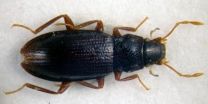Good guy or bad guy? Diagnosing stomach disease in pet reptiles
2011-06-01
(Press-News.org) Although known for over a century, cryptosporidiosis was believed to be an extremely rare condition and it only gained attention with the discovery that it can affect humans, especially immune-compromised individuals. It is caused by a single-cell parasite, one of a family known as cryptosporidia. Some cryptosporidia also infect reptiles, where after a sometimes lengthy incubation period they cause gastrointestinal problems even in otherwise healthy individuals. The condition is usually persistent and is presently impossible to cure. It is therefore important to minimize infections and in this regard reliable diagnostic procedures are essential.
Diagnosis is based on the detection of parasites in faeces but is complicated by the fact that snakes in particular excrete parasites that they swallow together with their prey, so the presence of cryptosporidia in faeces does not necessarily mean the animals are infected. For this reason it is essential to be able to distinguish between "prey" cryptosporidia and those that cause infection in the snake. Barbara Richter and colleagues at the Institute of Pathology and Forensic Veterinary Medicine in the University of Veterinary Medicine, Vienna now report a DNA-based procedure able to determine not only whether cryptosporidia are present but also whether they are of mammalian or snake origin.
By means of the test, Richter was able to show that a particular type of cryptosporidium is present in about one in six samples from the popularly kept corn snake and in about one in twelve samples from the attractive leopard gecko, a lizard frequently found in reptile collections. These prevalence figures are far higher than previously suspected, showing the widespread nature of the disease. The corn snake in particular seems highly susceptible to infection. Worryingly, the new tool revealed that a large proportion of captive leopard geckos contain cryptosporidia of one form or another. It is possible that some of the infections do not inconvenience the host geckos but the animals nevertheless represent a source of infection for other reptiles that come into contact with them. Many reptile collections house a number of species together and there is therefore a significant risk of cross-species infection.
The new diagnostic procedure represents a precise method for the early diagnosis of cryptosporidiosis in lizards and snakes, before the animals show symptoms of disease. Nevertheless, Richter still raises a cautionary note. "A further problem is that cryptosporidia are often present in faeces in very low numbers so it is easy to miss them in a single test. We are working to make our method more sensitive but it is very important to test the reptiles repeatedly. A negative result does not necessarily mean that the animal is really free of the parasite."
INFORMATION:
The paper Detection of Cryptosporidium species in feces or gastric contents from snakes and lizards as determined by polymerase chain reaction analysis and partial sequencing of the 18S ribosomal RNA gene by Barbara Richter, Nora Nedorost, Anton Maderner and Herbert Weissenböck is published in the May issue of the Journal of Veterinary Diagnostic Investigation (Vol. 23 pp. 430-435).
Full text version of the article: http://vdi.sagepub.com/content/23/3/430.full
About the Vienna University of Veterinary Medicine
The University of Veterinary Medicine, Vienna is the only academic and research institution in Austria that focuses on the veterinary sciences. About 1000 employees and 2300 students work on the campus in the north of Vienna, which also houses the animal hospital and various spin-off-companies.
http://www.vetmeduni.ac.at
Scientific contact:
Dr Barbara Richter, E barbara.richter@vetmeduni.ac.at, T +43 1 25077-2424
Released by
Klaus Wassermann, E klaus.wassermann@vetmeduni.ac.at, T +43 1 25077-1153
END
ELSE PRESS RELEASES FROM THIS DATE:
2011-06-01
A prior fracture at least doubles a patient's future fracture risk – yet numerous studies from across the world have found that healthcare systems fail to respond to the first fracture to prevent future fractures. Professor Cyrus Cooper, chair of the Committee of Scientific Advisors of the International Osteoporosis Foundation (IOF) and director of the MRC Lifecourse Epidemiology Unit, University of Southampton in the UK stated, "Studies from the UK, USA and Australia have reported that 45% or more of today's hip fracture patients have a prior fracture history. Healthcare ...
2011-06-01
Decorative white silk crosses are an ingenious tactic used by orb-weaving spiders to protect their webs from damage, a new study from the University of Melbourne has revealed.
The team, led by Dr Andre Walter and Professor Mark Elgar from the University of Melbourne's Department of Zoology, found that orb-weaving spiders respond to severe damage to their webs by building bigger silk crosses, but if the damage is mild they don't bother adding extra decoration.
Professor Mark Elgar said web damage is costly for spiders as a lot of nutritional resources are required to ...
2011-06-01
A large number of illnesses stem from misfolded proteins, molecules composed of amino acids. Researchers at the University of Zurich have now studied protein misfolding using a special spectroscopic technique. Misfolding, as they report in Nature, is more frequent if the sequence of the amino acids in the neighboring protein domains is very similar.
Proteins are the main molecular machines in our bodies. They perform a wide range of functions, from digesting and processing nutrients, converting energy and aiding cell structure to transmitting signals in cells and the ...
2011-06-01
The strength of sun cream recently recommended by the National Institute for Health and Clinical Excellence (NICE) to stave off sunburn is far too low and "not in the interests of public health," warns the Drug and Therapeutics Bulletin (DTB).
NICE should rethink its advice, and soon, it says.
NICE recommends sunscreens with a sun protection factor, or SPF, of 15 as sufficient to prevent sunburn and the subsequent potential risk of skin cancer.
But DTB says that this is based on standard test conditions in which manufacturers apply 2 mg/cm2 of product to the skin.
"In ...
2011-06-01
Permanent hair dye gives the most serious adverse effects, yet there are also many reactions to facial and body moisturisers. This comes from the first report from the National Register of Adverse Effects from Cosmetic Products published by the Norwegian Institute of Public Health.
"The Register gives us a better overview of the products that cause adverse effects, the type of adverse effect and who experiences them. Then we can make an assessment and even warn against the use of certain products," says researcher Berit Granum at the Division of Environmental Medicine ...
2011-06-01
Toronto – Not allowed to advertise your booze or smokes on a billboard?
That's okay. Research shows online advertising works especially well in places with government ad bans.
"If you want to regulate the offline world, you have to remember that people have access online too and you have to think about how that online world is going to mitigate the effects of your regulation," says Avi Goldfarb, a marketing professor at the University of Toronto's Rotman School of Management who co-wrote a study on the topic with Catherine Tucker of MIT's Sloan School of Management.
The ...
2011-06-01
Boston, Mass. – Researchers at Children's Hospital Boston and Google.org have found web-based search data to be a viable source of information for early detection and monitoring of outbreaks of dengue, an emerging mosquito-borne virus found in tropical areas of the world. Because search data allows the capture of disease-related queries in near real time, it could help public health officials in the more than 100 countries affected by dengue respond more quickly to nascent epidemics.
A team from the Children's Hospital Informatics Program (CHIP), led by John Brownstein, ...
2011-06-01
A European research team, with Spanish participation, has described two new beetle species measuring two millimetres in length. The coleoptera (beetles) were found in streams in the Pyrenees and Pre-Pyrenees mountains (from Gipuzkoa to Girona) and in the Sierra de la Demanda mountains (Burgos). Experts had previously thought that they belonged to another European species.
"These species, which have a restricted range, had been confused with another European species with a more extensive distribution (Hydraena saga) and so their independent evolutionary history was unknown", ...
2011-06-01
MadCap Software, Inc. (http://www.madcapsoftware.com), the leader in multi-channel content authoring and a showcase company for Microsoft Visual Studio and Microsoft XPS, today announced that revenues for Q1 2011 have grown 41% over Q1 2010, continuing the profitability that the company has enjoyed since launching its flagship product Flare in 2006. In the wake of strong growth, MadCap has increased its cash and accounts receivable by 30% over the same period ending 2010. At the same time, MadCap continues to invest in resources by expanding headcount by 21% over the previous ...
2011-06-01
Research from North Carolina State University shows that so-called biodegradable products are likely doing more harm than good in landfills, because they are releasing a powerful greenhouse gas as they break down.
"Biodegradable materials, such as disposable cups and utensils, are broken down in landfills by microorganisms that then produce methane," says Dr. Morton Barlaz, co-author of a paper describing the research and professor and head of NC State's Department of Civil, Construction, and Environmental Engineering. "Methane can be a valuable energy source when captured, ...
LAST 30 PRESS RELEASES:
[Press-News.org] Good guy or bad guy? Diagnosing stomach disease in pet reptiles



